SPORTS YOKOHAMA Vol.34:Feature(3/3)

The Yokohama City Government presented Yokohama Sports Honor Awards to eleven athletes associated with the city of Yokohama who earned medals at the London Olympic and Paralympic Games.
Gold medalists
Kohei Uchimura (men’s gymnastics individual all-around event)
Eiko Kakehata (Goalball)
Silver medalists
Nahomi Kawasumi, Yukari Kinga, Karina Maruyama, Kyoko Yano (women’s soccer)
Kohei Uchimura (men’s gymnastics team all-around event and floor exercise)
Koji Yamamuro (men’s gymnastics team all-around event)
Ryo Miyake (men’s team foil event)
Bronze medalists
Ryo Tateishi (men’s 200-meter breaststroke)
Ryutaro Matsumoto (men’s Greco-Roman 60 kg wrestling)
Ren Hayakawa (women’s archery team competition)
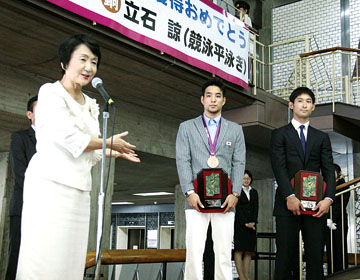
Presentation ceremony attended by Ryo Tateishi (center) and Ryo Miyake (right)
Interview with Eiko Kakehata, a Paralympic Gold Medalist
• Why did you start playing goalball?
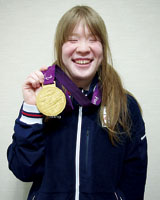 I didn’t like physical education when I was in elementary school and junior high school. While I liked mat exercise and vaulting boxes, I really hated ball games. I was born with poor eyesight, so the ball thrown at me suddenly came into view and I had to dodge in surprise. I would sometimes play catch with my father or brother in a park in my neighborhood, but I preferred playing with the jungle gym and other equipment. I went to a high school for the visually impaired. Until then, I didn’t know about goalball. I played it in my physical education class. But, at first, I couldn’t play at all because I was afraid to block the heavy fast ball with my entire body with my eyes blindfolded. When I was in the second grade, a friend of mine, who played goalball, asked me to join her team, saying that the team was short of a member. So I actually played the game and thought, “Wow, this is a lot easier than I anticipated.” I unexpectedly found goalball fun and got into the sport.
I didn’t like physical education when I was in elementary school and junior high school. While I liked mat exercise and vaulting boxes, I really hated ball games. I was born with poor eyesight, so the ball thrown at me suddenly came into view and I had to dodge in surprise. I would sometimes play catch with my father or brother in a park in my neighborhood, but I preferred playing with the jungle gym and other equipment. I went to a high school for the visually impaired. Until then, I didn’t know about goalball. I played it in my physical education class. But, at first, I couldn’t play at all because I was afraid to block the heavy fast ball with my entire body with my eyes blindfolded. When I was in the second grade, a friend of mine, who played goalball, asked me to join her team, saying that the team was short of a member. So I actually played the game and thought, “Wow, this is a lot easier than I anticipated.” I unexpectedly found goalball fun and got into the sport.
• What did you think before and during the London Paralympics?
Long before going to London, I was determined to win a gold medal. The team had a number of meetings so that the members could communicate with one another and share their thoughts. To build a relationship of trust, the coaches and players frequently met to stay in touch during the training camp and even during the Paralympics. So we were in a very good mood. As we advanced, our confidence grew. Before the final, the atmosphere of the team was great. Everyone thought, “We can do it. Let’s beat the Chinese team in the final!” Given the momentum we had, I was confident that we would win the final.
• And you won the gold medal!
The moment the game-ending buzzer sounded, I felt joy well up in my heart. Everyone hugged, cried with delight and bowed to the spectators in thanks for their support. We won the gold medal because we were able to come together as a team. The staff and coaches analyzed the opponent teams and created effective strategies for us. The coaches, staff and players – we all deserve credit for the gold medal.
Since coming home from the Paralympics, we have received some degree of media attention and I feel that goalball is now better known than before. At the college, more people show interest in goalball and playing it. That’s encouraging to me.
During a women’s tournament the other day, we had a small workshop and I was glad that a lot of people took part in it. Before the Paralympics, goalball was little known. So I am happy to see goalball become popular because of the gold medal we brought home.
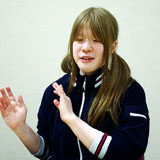 Eiko Kakehata
Eiko Kakehata
Birth date: February 19, 1993
Home town: Kanazawa Ward, Yokohama
She now studies at Yokohama College of Art and Design.
Her father, Mitsunori Kakehata, was a former professional baseball player with the Yokohama BayStars.
Interview with Ryo Miyake, an Olympic Silver Medalist
• What made you interested in fencing?
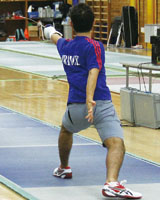 I was a member of a swimming club when I was a first grader in elementary school. But I was not good at backstroke and wanted to try some other kind of sport. And I happened to see a poster pinned up on a bulletin board at a local culture school, and the poster had a picture of a fencing player. I thought, “Wow, I want to do this.” I loved wielding a toy sword when I was a kid. So fencing came naturally to me, and I soon started to enjoy the sport.
I was a member of a swimming club when I was a first grader in elementary school. But I was not good at backstroke and wanted to try some other kind of sport. And I happened to see a poster pinned up on a bulletin board at a local culture school, and the poster had a picture of a fencing player. I thought, “Wow, I want to do this.” I loved wielding a toy sword when I was a kid. So fencing came naturally to me, and I soon started to enjoy the sport.
• What does it take to be a good fencer?
In fencing, you need instantaneous force when thrusting the sword, as well as stamina because you constantly move during the game. Whatever kinds of sports, children with a positive attitude who hate losing and love the sports they do make good players in most cases.
In order to win a medal, you need to understand what the sport requires and figure out objectively what you should do to win. Just practicing a lot without purpose doesn’t get you anywhere. I think that, when you practice, it’s important that you focus on what you should do to win.
• Tell us what’s fun about fencing.
Unlike Kendo (Japanese art of fencing), fencing has no particular forms. While there are some basic stances and moves you need to learn, much depends on your personality. Each of the four members of the Japanese men’s foil team takes a different en garde position and plays the game in a different way. I think that looking at the game of fencing from a new angle like this might make you aware of another aspect of this sport that is fun to watch. I’m not the gorgeous kind of fencer, like Yuki Ota, who performs a whipping attack that involves thrusting the blade to the back of the opponent. I think I’ll stick to the simple style of scoring touches one by one in a down-to-earth manner with whatever technique that I see fit.
• You said you would like to continue to cooperate in promotional activities.
Yes. Fencing is still a minor sport, so I think that making fencing known to more people is the most important thing. Yuki Ota, who won a silver medal in the Beijing Olympics, has organized a very big fencing tournament, called the Ota Yuki Cup, for elementary school pupils.
What I want to do as an athlete is to work closely with the local community. So I intend to hold workshops in this area to let people know more about the fun of fencing. In order to promote fencing to children, I want to develop systematic teaching programs and offer fencing classes where you can learn fencing techniques properly no matter who teaches you.
• Message from Ryo Miyake
You get to meet people through sports. If you excel in the sport you play, you will have chances to get to know athletes of other sports and hear inspiring stories from them. So I hope that children meet a variety of people through sports and gain broader insights by exchanging ideas and views with those people.
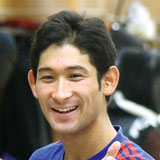 Ryo Miyake
Ryo Miyake
Birth date: December 24, 1990
He now studies in the faculty of letters at Keio University.
He won the men’s individual foil competition at the Under 17 World Championships and finished third in the 2012 Asian Championships. At the London Olympics, he took second place at the team competition with his teammates – Yuki Ota, Kenta Chida and Suguru Awaji – to win a silver medal.

The Yokohama City Government presented Yokohama Sports Honor Awards to eleven athletes associated with the city of Yokohama who earned medals at the London Olympic and Paralympic Games.
Gold medalists
Kohei Uchimura (men’s gymnastics individual all-around event)
Eiko Kakehata (Goalball)
Silver medalists
Nahomi Kawasumi, Yukari Kinga, Karina Maruyama, Kyoko Yano (women’s soccer)
Kohei Uchimura (men’s gymnastics team all-around event and floor exercise)
Koji Yamamuro (men’s gymnastics team all-around event)
Ryo Miyake (men’s team foil event)
Bronze medalists
Ryo Tateishi (men’s 200-meter breaststroke)
Ryutaro Matsumoto (men’s Greco-Roman 60 kg wrestling)
Ren Hayakawa (women’s archery team competition)

Presentation ceremony attended by Ryo Tateishi (center) and Ryo Miyake (right)
Interview with Eiko Kakehata, a Paralympic Gold Medalist
• Why did you start playing goalball?
 I didn’t like physical education when I was in elementary school and junior high school. While I liked mat exercise and vaulting boxes, I really hated ball games. I was born with poor eyesight, so the ball thrown at me suddenly came into view and I had to dodge in surprise. I would sometimes play catch with my father or brother in a park in my neighborhood, but I preferred playing with the jungle gym and other equipment. I went to a high school for the visually impaired. Until then, I didn’t know about goalball. I played it in my physical education class. But, at first, I couldn’t play at all because I was afraid to block the heavy fast ball with my entire body with my eyes blindfolded. When I was in the second grade, a friend of mine, who played goalball, asked me to join her team, saying that the team was short of a member. So I actually played the game and thought, “Wow, this is a lot easier than I anticipated.” I unexpectedly found goalball fun and got into the sport.
I didn’t like physical education when I was in elementary school and junior high school. While I liked mat exercise and vaulting boxes, I really hated ball games. I was born with poor eyesight, so the ball thrown at me suddenly came into view and I had to dodge in surprise. I would sometimes play catch with my father or brother in a park in my neighborhood, but I preferred playing with the jungle gym and other equipment. I went to a high school for the visually impaired. Until then, I didn’t know about goalball. I played it in my physical education class. But, at first, I couldn’t play at all because I was afraid to block the heavy fast ball with my entire body with my eyes blindfolded. When I was in the second grade, a friend of mine, who played goalball, asked me to join her team, saying that the team was short of a member. So I actually played the game and thought, “Wow, this is a lot easier than I anticipated.” I unexpectedly found goalball fun and got into the sport.
• What did you think before and during the London Paralympics?
Long before going to London, I was determined to win a gold medal. The team had a number of meetings so that the members could communicate with one another and share their thoughts. To build a relationship of trust, the coaches and players frequently met to stay in touch during the training camp and even during the Paralympics. So we were in a very good mood. As we advanced, our confidence grew. Before the final, the atmosphere of the team was great. Everyone thought, “We can do it. Let’s beat the Chinese team in the final!” Given the momentum we had, I was confident that we would win the final.
• And you won the gold medal!
The moment the game-ending buzzer sounded, I felt joy well up in my heart. Everyone hugged, cried with delight and bowed to the spectators in thanks for their support. We won the gold medal because we were able to come together as a team. The staff and coaches analyzed the opponent teams and created effective strategies for us. The coaches, staff and players – we all deserve credit for the gold medal.
Since coming home from the Paralympics, we have received some degree of media attention and I feel that goalball is now better known than before. At the college, more people show interest in goalball and playing it. That’s encouraging to me.
During a women’s tournament the other day, we had a small workshop and I was glad that a lot of people took part in it. Before the Paralympics, goalball was little known. So I am happy to see goalball become popular because of the gold medal we brought home.
 Eiko Kakehata
Eiko Kakehata
Birth date: February 19, 1993
Home town: Kanazawa Ward, Yokohama
She now studies at Yokohama College of Art and Design.
Her father, Mitsunori Kakehata, was a former professional baseball player with the Yokohama BayStars.
Interview with Ryo Miyake, an Olympic Silver Medalist
• What made you interested in fencing?
 I was a member of a swimming club when I was a first grader in elementary school. But I was not good at backstroke and wanted to try some other kind of sport. And I happened to see a poster pinned up on a bulletin board at a local culture school, and the poster had a picture of a fencing player. I thought, “Wow, I want to do this.” I loved wielding a toy sword when I was a kid. So fencing came naturally to me, and I soon started to enjoy the sport.
I was a member of a swimming club when I was a first grader in elementary school. But I was not good at backstroke and wanted to try some other kind of sport. And I happened to see a poster pinned up on a bulletin board at a local culture school, and the poster had a picture of a fencing player. I thought, “Wow, I want to do this.” I loved wielding a toy sword when I was a kid. So fencing came naturally to me, and I soon started to enjoy the sport.
• What does it take to be a good fencer?
In fencing, you need instantaneous force when thrusting the sword, as well as stamina because you constantly move during the game. Whatever kinds of sports, children with a positive attitude who hate losing and love the sports they do make good players in most cases.
In order to win a medal, you need to understand what the sport requires and figure out objectively what you should do to win. Just practicing a lot without purpose doesn’t get you anywhere. I think that, when you practice, it’s important that you focus on what you should do to win.
• Tell us what’s fun about fencing.
Unlike Kendo (Japanese art of fencing), fencing has no particular forms. While there are some basic stances and moves you need to learn, much depends on your personality. Each of the four members of the Japanese men’s foil team takes a different en garde position and plays the game in a different way. I think that looking at the game of fencing from a new angle like this might make you aware of another aspect of this sport that is fun to watch. I’m not the gorgeous kind of fencer, like Yuki Ota, who performs a whipping attack that involves thrusting the blade to the back of the opponent. I think I’ll stick to the simple style of scoring touches one by one in a down-to-earth manner with whatever technique that I see fit.
• You said you would like to continue to cooperate in promotional activities.
Yes. Fencing is still a minor sport, so I think that making fencing known to more people is the most important thing. Yuki Ota, who won a silver medal in the Beijing Olympics, has organized a very big fencing tournament, called the Ota Yuki Cup, for elementary school pupils.
What I want to do as an athlete is to work closely with the local community. So I intend to hold workshops in this area to let people know more about the fun of fencing. In order to promote fencing to children, I want to develop systematic teaching programs and offer fencing classes where you can learn fencing techniques properly no matter who teaches you.
• Message from Ryo Miyake
You get to meet people through sports. If you excel in the sport you play, you will have chances to get to know athletes of other sports and hear inspiring stories from them. So I hope that children meet a variety of people through sports and gain broader insights by exchanging ideas and views with those people.
 Ryo Miyake
Ryo Miyake
Birth date: December 24, 1990
He now studies in the faculty of letters at Keio University.
He won the men’s individual foil competition at the Under 17 World Championships and finished third in the 2012 Asian Championships. At the London Olympics, he took second place at the team competition with his teammates – Yuki Ota, Kenta Chida and Suguru Awaji – to win a silver medal.
 ハマスポ
ハマスポ
 お知らせ&トピックス
お知らせ&トピックス ページトップへ戻る
ページトップへ戻る ページトップへ戻る
ページトップへ戻る

